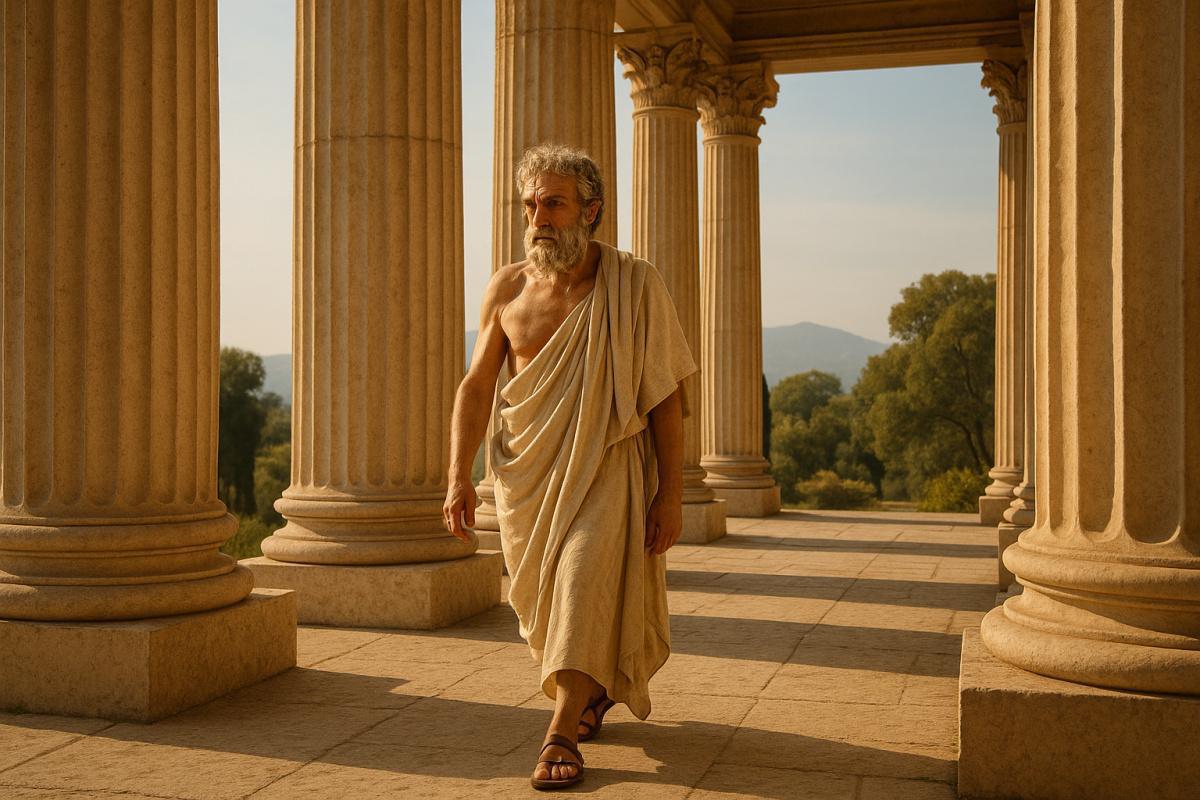Agostino Scilla, Agostino Scilla. The philosopher Epicurus, CC BY-SA 4.0
Epicurus, the ancient Greek philosopher who lived from 341 BCE to 270 BCE, is often remembered for his advocacy of pleasure as the highest good. Yet, to leave it at that would be a great disservice. His philosophy is not the hedonism of late-night parties and indulgent feasts, but a carefully reasoned system that sought tranquility, freedom from fear, and the absence of bodily pain. Epicurus was a materialist who believed that everything is made of atoms moving through the void, and his worldview aimed to liberate human beings from superstition and unnecessary suffering.
Born on the island of Samos, Epicurus eventually founded his school in Athens around 306 BCE. Known as “The Garden,” this community was unique in its time for welcoming not just men but also women and even slaves—something unthinkable to most philosophical circles of the day. The Garden was not just a place of learning but a model for living a thoughtful life. His students were taught that philosophy was a tool for everyday happiness, not merely abstract speculation. Epicurus wanted philosophy to be a medicine for the soul.
Central to Epicurus’s teaching was the idea of ataraxia, or peace of mind. He argued that the greatest source of human misery was not hunger, nor even pain, but fear: fear of death, fear of the gods, and fear of the unknown. By understanding the natural world—its atoms, its void, and its lack of divine intervention—humans could learn to live free from these anxieties. This rational dismantling of fear was his version of spiritual therapy, designed to help people live in calm contentment.
Contrary to stereotypes, Epicurus did not advocate for wild indulgence. He classified pleasures into natural and necessary, natural but unnecessary, and vain or empty. The simplest pleasures—such as bread, water, and friendship—were, to him, the most essential. Luxuries like feasts or wealth could be enjoyed, but they were not necessary for happiness. And pursuits like fame or boundless riches he dismissed as illusions that only stirred endless dissatisfaction. In this way, Epicurus was closer to a minimalist than to a glutton.
The role of friendship was particularly elevated in Epicurean thought. Epicurus declared that of all the things wisdom provides for happiness, the greatest by far is friendship. In the Garden, bonds of companionship offered security and joy, and they were valued as much as the philosophical teachings themselves. For Epicurus, friends were the antidote to loneliness, a safeguard against fear, and a reminder that the good life is often shared rather than hoarded.
Epicurus’s view on death remains one of his most famous contributions. He argued that “death is nothing to us,” for when we exist, death is not present, and when death is present, we no longer exist. This simple but profound reasoning was meant to dissolve humanity’s greatest fear. By reminding us that death is simply the absence of sensation, Epicurus encouraged his followers to embrace life without the shadow of dread. Mortality, instead of being a curse, was just a natural boundary.
Politically, Epicurus advised withdrawal from public life, not out of apathy but out of practicality. He believed that politics was fraught with ambition, corruption, and anxiety, all of which disrupted peace of mind. Instead, he promoted a quieter life of study, conversation, and community. In this sense, his philosophy stands in stark contrast to the civic-minded Stoics, who encouraged participation in public affairs. Epicurus saw the good life as inward, personal, and free from the turmoil of political struggle.
Over the centuries, Epicurean philosophy has been both celebrated and maligned. Early Christians criticized Epicurus as a dangerous heretic, associating his name with indulgence and sin. Yet, Renaissance humanists and Enlightenment thinkers found in his writings a refreshing challenge to dogma and superstition. His materialist view of the universe influenced figures like Lucretius, whose poem On the Nature of Things preserved much of Epicurus’s thought and inspired generations to think scientifically about the world.
In the modern age, Epicurus resonates with both secular philosophy and wellness culture. His emphasis on simplicity, friendship, and moderation feels strikingly contemporary. In an age of consumerism and endless digital distraction, Epicureanism’s call to focus on essential pleasures—good company, meaningful conversation, a simple meal—feels like an antidote to the overstimulation of modern life. He might be surprised, but perhaps gratified, to find that his philosophy has found renewed relevance among those searching for calm in a frenetic world.
Ultimately, to meet Epicurus is to meet a philosopher who believed that life’s highest aim was not grandeur, glory, or conquest, but rather the modest pursuit of happiness through wisdom, friendship, and tranquility. His Garden was a haven for those who sought a philosophy they could live, not just study. And his words, echoing across millennia, remind us that contentment often comes not from abundance, but from learning to desire less and appreciate more. Epicurus remains less a hedonist than a sage of simplicity.


